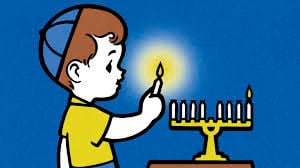
The holiday of Pesach has two different names in the Torah: Chag Ha-matzot (the Festival of Matzot) (Shemot 23:15) and Chag Ha-Pesach (the Paschal festival, or Passover) (Shemot 34:25). These two names express two different meanings of the holiday: Chag Ha-matzot represents the revelation of God’s providence, and Chag Ha-Pesach represents Israel’s unique spiritual capacity.
At the Exodus from Egypt, God’s sovereignty over the world was given its most apparent and concrete manifestation. Thus, our faith in God is fundamentally rooted in the Exodus. The matzoh symbolizes this aspect of our holiday, as we read in the Haggadah: “This matzoh that we eat – what is the reason? Because our forefathers’ dough did not have time to rise before the holy Supreme King of kings revealed Himself to them and redeemed them.”
The unique mission and destiny of the people of Israel was also revealed at the time of the Exodus. The distinction between the Egyptians and the Israelites was conspicuous in all of the plagues, as the Egyptians were struck and the Israelites were saved. This culminated with the Plague of the Firstborn, when the Destroyer struck every Egyptian household but passed over (pasach) Israelite homes. Israel’s uniqueness is expressed through and symbolized by the Paschal sacrifice.
These two fundamental principles – faith and Israel – are linked together and interdependent. Unlike the other nations, which are formed through human endeavor, the nation of Israel was forged through divine miracles and wonders at the time of the Exodus for the purpose of receiving God’s Torah. Israel’s status entirely depends on their connection with God: when Israel does God’s will and makes God’s name manifest in the world, they earn all the blessings promised in the Torah. But when they do not fulfill God’s will, all of the curses written in the Torah are visited upon them.
The revelation of God’s name in the world, i.e., the manifestation of divine values on earth, depends upon Israel, as Scripture states: “I created this nation for My sake; they will tell My praise” (Yeshayahu 43:21). For this reason, the Sages stated (Bereishit Rabba 1:4) that the idea of Israel preceded the creation of the world, for it is through Israel that the purpose of the world is revealed. This is what the Sages meant when they said, “God set a condition with Creation: ‘If Israel accepts the Torah, you will continue to exist, but if not, then I will return you to being formless and void’” (Shabbat 88a). Israel’s unique capabilities were further made manifest in that God chose us to be His nation and children, in spite of the fact that we were lowly slaves, stuck in the morass of impurity in Egypt.
Thus the two biblical names of the holiday express two aspects of one matter, namely, the revelation of God’s name in the world through Israel.
Rabbi Eliezer Melamed is one of the most widely read Torah educators in Israel today. His Peninei Halakha series has sold over 300,000 copies in Hebrew and is used as a textbook in many Israeli schools. Laws of Pesach is the second volume of Peninei Halakha in English, published by Maggid Books, a division of Koren Publishers Jerusalem.













